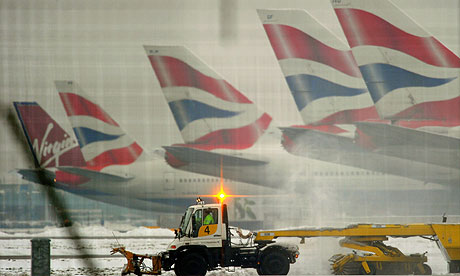
When temperatures plunged below zero last December and Heathrow ground to a halt, the festive travel plans of around one million passengers were left in tatters. Now the managers of Europe's busiest airport have dreamed up a solution to prevent a repeat of the nightmare before Christmas: underfloor heating, but on a massive scale.
BAA, which runs Heathrow, is exploring technology to capture the heat of the summer sun as it beats down on the airport's asphalt and store it until winter to keep the planes moving. The idea, which combines the principles of Roman central heating with 21st-century renewable energy technology, is intended to stop planes becoming stuck in ice on their stands, which was the main cause of the problems last year.
Heathrow could not operate at full capacity for five days after an hour-long snowstorm dumped nearly 13cm (5in) of snow followed by a sudden drop in temperature. There was anger that Heathrow was so easily crippled and Philip Hammond, the transport secretary, ordered an immediate review. It identified "a low state of preparedness" for snow that was forecast many days ahead and a lack of specialised equipment to clear it. Hammond said climate change could mean more regular repeats of the extreme temperatures that forced thousands of passengers to sleep in terminal buildings.
"It is not the snow that caused problems last year, it was the ice," Steve Morgan, BAA's capital projects director, told Building magazine. "We are working on a concept to capture geothermal energy from the surface of the Tarmac … during the summer to then provide a heating capability so the stands don't freeze in the winter. We would store the energy underground and use it to gently heat water that would run through pipes in freezing conditions to warm the stands, which are the slabs of concrete directly beneath the planes, to just above zero."
The cost of the project is yet to be estimated, but Morgan said it could be paid for by postponing a facelift for one of the terminals, such is the level of concern at Heathrow's collapse in the winter.
BAA is working with an unnamed private company on the plan, which would require digging sump holes up to 10m deep to fit technology to store energy and pump warmed water under the stands. Only the areas beneath the wheels and where crews need to inspect and load the planes would need to be warmed.
Another option, which involves pumping water from deep underground, which is naturally above freezing even in cold conditions, up towards the frozen surface, is also being explored.
Heathrow has 200 stands, but to limit costs the idea could be rolled out to just a few to at least keep some flights moving.
Morgan said he believed the project was viable, adding that Heathrow would probably be the first airport to try it.
• This article was amended on 15 April 2011. The original referred to British Airports Authority, which runs Heathrow. This has been corrected.

